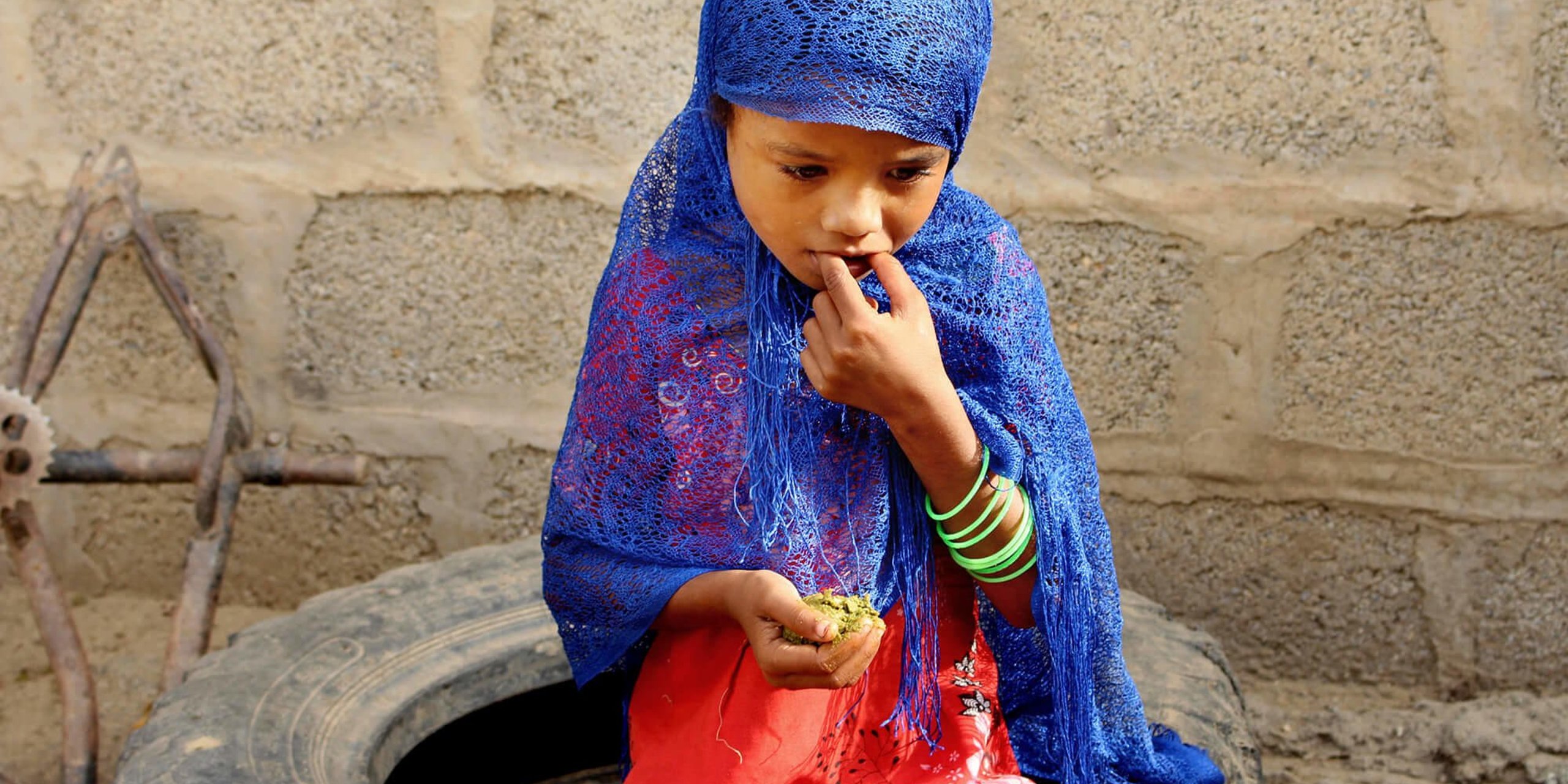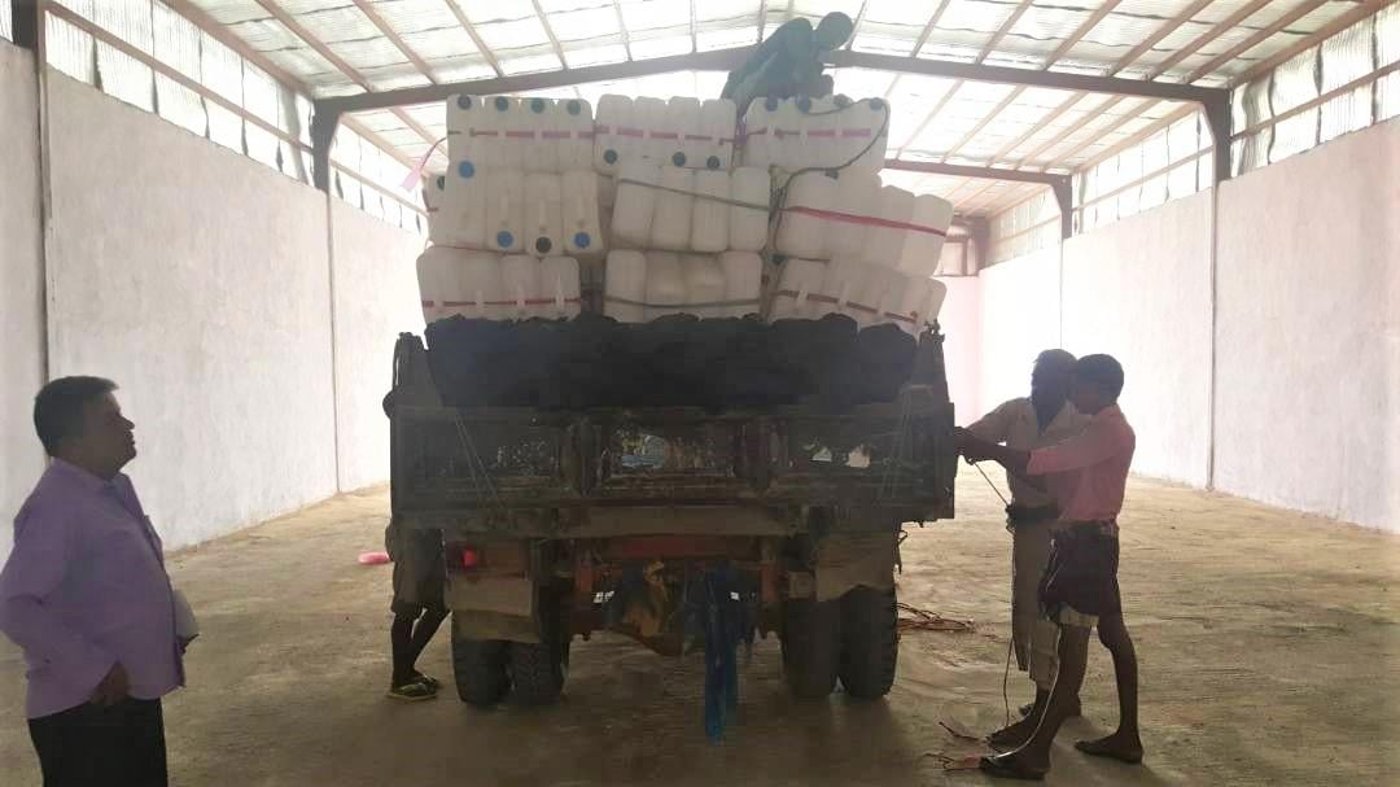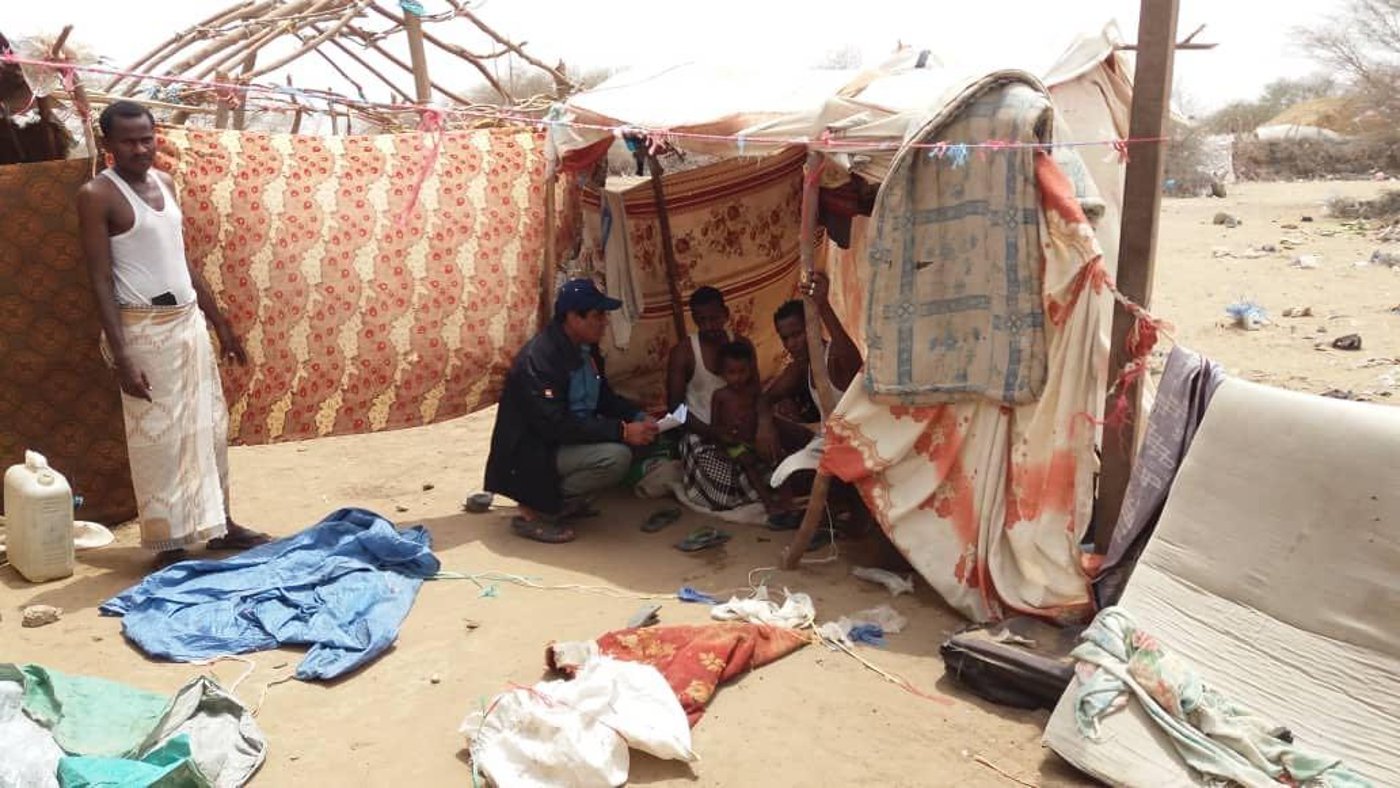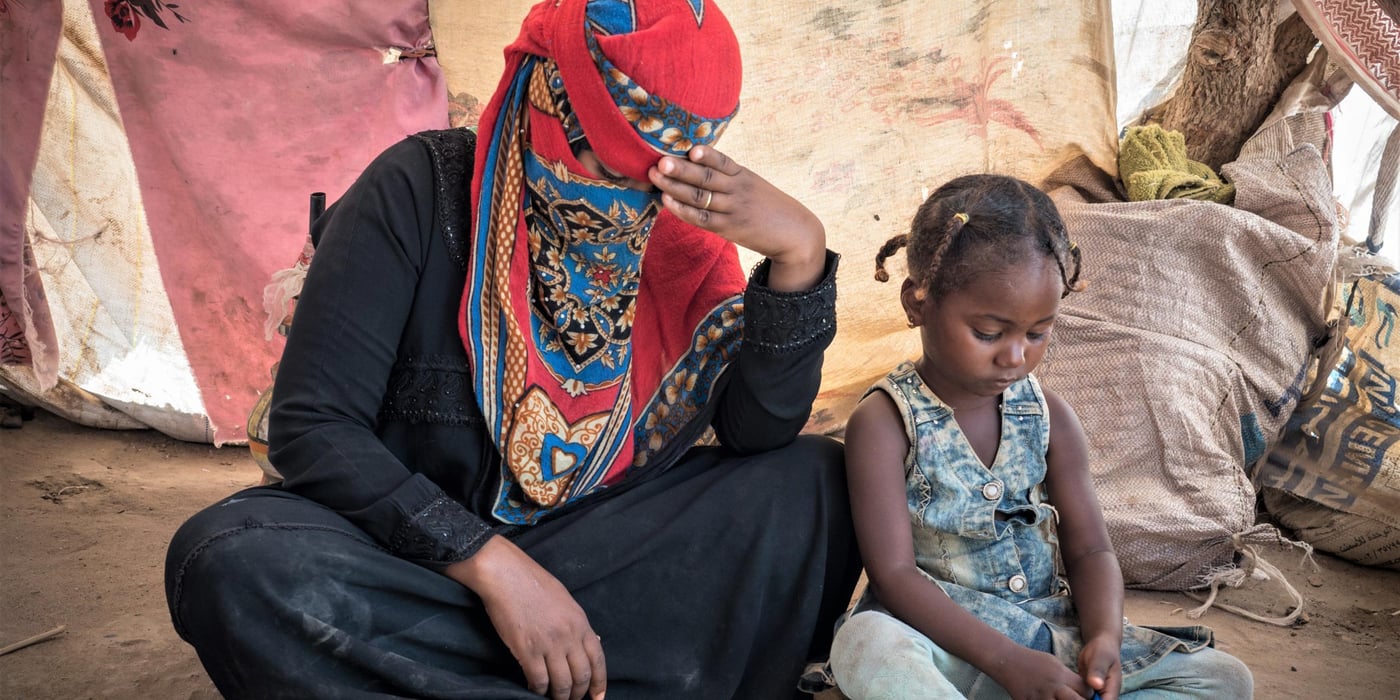
Flickan i bilden ovan försöker lindra den värsta hungern genom att äta kokta vinblad. För många föräldrar är detta det enda ätbara som de kan erbjuda sina barn.
Sedan krigshandlingarna startade i mars 2015 har nästan 10 000 civila dödats och 50 000 sårats. Tre miljoner jemeniter har fördrivits från sina hem.
Kriget och den pågående blockaden har lett till akut matbrist och en galopperande inflation.

Fem miljoner riskerar att dö av svält
I november förra året slog FN larm. De uppskattade att 400 000 barn skulle behöva behandlas för akut undernäring och fruktade att 50 000 barn skulle dö. Sedan dess har situationen blivit allt värre, och Rädda Barnen varnar för en svältkatastrof som kan drabba över fem miljoner människor.
NRC:s Becky Bakr Abdulla har varit på plats i Jemen, ett land i fritt fall med dagliga bombangrepp och en fullständigt kollapsad ekonomi.
”Människor som har haft tillräckligt att leva av, måste nu tigga på gatorna för att överleva. Det är verkligheten för jemeniter idag och har så varit i över tre år.”Becky Bakr Abdulla, NRC
– Människor som har haft tillräckligt att leva av, måste nu tigga på gatorna för att överleva. Det är verkligheten för jemeniter idag och har så varit i över tre år.
Jemen var redan ett av de fattigaste länderna i regionen före kriget, och nu har en ekonomisk kollaps fört landet in i en humanitär kris. Enligt Becky märker befolkningen det på tre sätt: priserna på vanliga livsmedel som ris och bröd har stigit dramatiskt, många får inte längre ut sin lön och valutan har fallit kraftigt i värde.
– Ekonomin i landet håller på att krascha helt. Många går desperat ut på gatorna för att försöka göra sina röster hörda och demonstrera. Flera har nått bristningsgränsen.

NRC arbetar intensivt
NRC arbetar intensivt med att få fram nya leveranser av mat och annan nödhjälp, men restriktioner från båda krigförande parter gör det svårt att nå fram med hjälp till dem som behöver det.
Under 2017 gav NRC livräddande hjälp till mer än 760 000 personer i landet. Becky är imponerad av insatsen från de jemenitiska kollegorna, som har bott och arbetat i kriget i över tre år.
– Många av våra kollegor har själva drivits på flykt och lever i konstant rädsla för egen del och för sina familjer. Ändå kommer de till jobbet varje dag, för att göra en insats för sina medborgare. De lever under enorm press och gör ett beundransvärt jobb. Själv kan jag sätta mig på ett FN-plan och resa hem till trygga Norge. De blir kvar här.
Läs också intervjun med NRC:s Becky Bakr Abdulla, som tillbringade två veckor mitt i krigszonen.



![Yasin Ismail has been working for NRC for five years and believes NRC is one of the best organisation to work for. Yasin started working for NRC as an Education Assistant and is now an Education Coordinator at NRC's Aden area office.
Yasin believes education is a critical component of the work NRC does, because of its great impact on people’s lives. He recognises it as a basic human right, important to the development of children and youth to fulfill their potential, and critical to breaking the inter-generational cycle of poverty.
The impact of the conflict in Yemen has been catastrophic. Schools have been destroyed or occupied by armed groups or displaced populations, which have deprived children in some areas from accessing school for more than four years.
Children in Yemen are struggling to cope with the violence they have faced during the conflict, and continue to face imminent danger as conflict carries on and exposes them to UXOs, mines and crossfire.
Yasin believes the security situation, which results in restricted access and unpredictable funding for education, are two of the main challenges in his job. He said that affected communities need access to aid but will sometimes have challenges accessing this due to long delays at checkpoints or challenges reaching distribution sites.
Yasin wants to help and support those affected by war in Yemen and believes that we can change the world with education. “[We should] Always follow our dreams and believe in ourselves. For every ending - there is a new beginning, for every memory - there is a dream ahead.”
"I hope for peace and stability for our people and country. I hope for our children and youth to get quality education because that will help them to build their future. I believe the education is the only approach to protect future generations, because it gives people a chance for healthy development, restores a sense of normality, and provides important life skills. Further to that, an education intervention is an investment in the long-term future, and in the peace, stability and economic growth of Yemen”.
More information:
These kids, like many others, leave for school very early because it takes them an hour or as long as two hours for some to walk. Ensuring children have sufficient access to nutrition is very important for children expending huge amounts of energy on commuting, learning and playing, and ensures they are able to engage appropriately in class. Lialy was among the children without anything to eat before coming to school. NRC has started to provide high energy biscuits to children in Lialy's school, who expressed their happiness at receiving the biscuits. Several children mentioned feeling more energetic and active as a result, and said they could concentrate more in class.
Information about the school:
Al-Qadisia school is located in Al-Qubbiyta district in Lahj and was one of the first schools in which NRC has delivered programmes. NRC's team describe the AlQadisia as a normal school with an engaged community but experiencing problems including nearby landmines. As displaced families continue to move into the area, the number of students at the school continues to grow, creating overcrowding. NRC's programme is supporting rehabilitation of the school building, distribution of recreational, cleaning and scholastic materials, training of teachers and provision of high energy biscuits for students.
Education in Hard to Reach Areas:
One of NRC’s global priorities is to deliver aid and services to people in hard to reach areas. We worked with the Education Department to select this school and others identified as being among the most in need. In travelling to the school form NRC's office in Aden, staff encounter several checkpoints, threatened areas and landmines.
Our programming in Yemen's southern governorates reaches people in Lahj, Abyan and Al-Dalea, among other areas. Operating in these areas is complicated and challenging: our staff travel through checkpoints, some of which create traffic, preventing access to project sites. Several areas remain affected or threatened by conflict, explosions are often heard, landmines dot areas across Yemen and bureaucratic challenges delay or complicate processes.
Where mines explode, civilians can suffer on multiple levels as people cannot only sustain injuries, but lose mobility and access to fields and other sites used for cultivation.
Efforts should be made to call on the authorities and specialised organisations to strengthen demining operations and reduce the number of civilian casualties.
Photo: Ingrid Prestetun/NRC](/cdn-cgi/image/width=1400,format=auto,fit=crop,height=700/globalassets/sverige/yemen-31.jpg)

